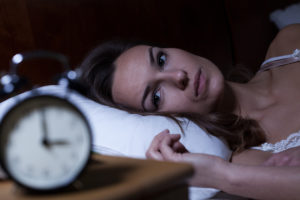Sleep is the most restorative time of the day, so waking up multiple times a night to urinate can significantly impact your quality of sleep and overall health.
If you suffer from Nocturia (increased frequency to urinate at night), here are some things to consider.
Check your legs.
If you notice your feet and legs are swollen at the end of the day, you are likely retaining an excessive amount of fluid. What exactly does this look like? If you push with a finger on your skin and an indention remains when you remove your finger, then your legs are swollen.
Edema (fluid retention) can be due to cardiovascular concerns. However, it could also be due to that big bag of salty potato chips you ate before dinner or because you sat all day working in front of a computer with your legs bent.
Solution 1: Stop eating those salty snacks – excessive salt will make your body retain water.
Solution 2: Elevate your legs one hour before bedtime and do about five minutes of ankle pumps. Then go urinate and urinate again immediately before bed.
If you do have any concerns of a possible cardiovascular problem, please seek medical guidance by your physician as soon as possible.
What. Are. You. Eating?
Above, we established that eating salty foods will cause you to retain water, but there are other foods that can make your bladder grumpy and cause urinary urgency and frequency both day and night. If you eat or drink an item known to be a bladder irritant, it may contribute to your nighttime urination woes.
Solution: Try an elimination diet. Consistently avoid a bladder irritant for a few days to see if that food or beverage is contributing to your nocturia. The big culprits tend to be caffeinated beverages (coffee/tea), carbonated beverages (even sparkling water), alcohol, chocolate (hello chocolate fudge sundaes!), and spicy food. There are others too, so be sure to read this blog segment for a list of common irritants.
How are you sleeping?
We call it sleep hygiene. Not sure if you have good sleep hygiene? Here are some tips:
- Keep a consistent schedule or routine at night.
- Limit screen time, which can disrupt brain activity and melatonin production.
- Try meditation or relaxation techniques. There are some great apps for your phone that help relax your body and can provide you with guided meditation techniques.
- Create an environment conducive to high quality sleep. Find a comfy sleeping position. Try to avoid falling asleep with the lights and TV on. Eliminate all the other factors from your bedroom that could disrupt your sleep, like a cat that enjoys gymnastics on your bed at 2 am (I speak from personal experience on that one).
Do you have sleep apnea?
Nocturia occurs in 50% of people with Obstructive Sleep Apnea (OSA)1. Sleep apnea can alter how your body functions at night, causing an increase in urine production and therefore an increased need to urinate at night.
Solution: Consult a sleep expert or your doctor and if you have been prescribed a CPAP machine for sleep apnea, then use it!
Medications
Some medications, like diuretics, can also cause urinary frequency.
Solution: Speak with your medical provider if you have any concerns about the side effects of medications and confirm if your medication could be taken earlier in the day.
Please keep in mind, for some of you, Nocturia could be a sign of certain medical conditions that require more immediate medical intervention, so please always consult your medical provider regarding your specific urinary symptoms and concerns.
For everyone else, try some of these simple solutions and hopefully you will find some relief!
Written by: Alison Gallup, PT, DPT, OCS
Works Cited:
1) Leslie SW, D’Andrea V, Sajjad H, et al. Nocturia. [Updated 2019 Sep 28]. In: StatPearls [Internet]. Treasure Island (FL): StatPearls Publishing; 2020 Jan-. Available from: https://www.ncbi.nlm.nih.gov/books/NBK518987/


Comments are closed.